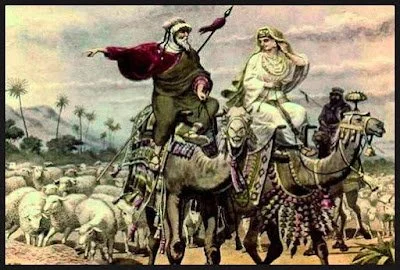Genesis 12:1-9
12Now the Lord said to Abram, “Go from your country and your kindred and your father’s house to the land that I will show you. 2I will make of you a great nation, and I will bless you, and make your name great, so that you will be a blessing. 3I will bless those who bless you, and the one who curses you I will curse; and in you all the families of the earth shall be blessed.” 4So Abram went, as the Lord had told him; and Lot went with him. Abram was seventy-five years old when he departed from Haran. 5Abram took his wife Sarai and his brother’s son Lot, and all the possessions that they had gathered, and the persons whom they had acquired in Haran; and they set forth to go to the land of Canaan. When they had come to the land of Canaan, 6Abram passed through the land to the place at Shechem, to the oak of Moreh. At that time the Canaanites were in the land. 7Then the Lord appeared to Abram, and said, “To your offspring I will give this land.” So he built there an altar to the Lord, who had appeared to him. 8From there he moved on to the hill country on the east of Bethel, and pitched his tent, with Bethel on the west and Ai on the east; and there he built an altar to the Lord and invoked the name of the Lord. 9And Abram journeyed on by stages toward the Negeb.
Have you ever wondered about those neglected stories which never made their way into the bible? Today we heard the stories of the call of Abram. Abram, or Abraham as he is later called, takes center stage and emerges as the religious hero of Jews, Christians and Muslims. God tells Abram: Go from your country and your kindred and your father’s house to the land that I will show you.
Notice the levels of sacrifice God is requiring: forsaking the familiarity of your country, its language, customs and foods, your kindred, the circle of people who make you who you are, and your father’s house, the security and identity of being a part of this small group of people among whom you were born and with whom you have discovered your identity. God tells Abram to give up all of those treasured relationships.
But God says nothing to Sarai, his wife. Can you imagine what Sarai felt when Abram announces that he is uprooting them from all that is familiar and setting out on the dangerous road to an unknown country and an uncertain future. They embark on this journey into an unfamiliar future when they should have begun their retirement.
Sarai’s story is not told. God does not speak directly to her, only to her husband. We shall get to know Sarai in the upcoming weeks and she is no shrinking violet. Her’s is the unwritten story, the text of silenced voices.
Perhaps we come to expect that the bible, written by men, pays scarce attention to the voices of women, slaves and those on the margins. Perhaps we can overcome this omission in the biblical text, fill in the gaps, and wonder about the faith of Sarai, of Sarai’s slave, Hagar, of the other slaves and servants who had to leave behind all that was familiar and venture into the fearful unknown of their journey to a new land.
If we can imagine the fears and anxiety of Sarai, perhaps we can also make another leap. Perhaps we can feel the terror and consternation of contemporary displaced persons. We hear the stories of refugees fleeing political and gang violence in Cuba, Venezuela and Columbia. We see the caravans of families leaving Ukraine, Syria and Sudan uncertain of their future, vulnerable to outlaws, without money, language, family or skill and settling in a new and unfamiliar land. Perhaps, as we listen to the silence of Sarai, we can hear the silences of the refugees of our days, the immigrants searching for a new future, the asylum seekers fleeing persecution and terror.
If we train our hearts to hear the voices of the Sarai’s of our day, the cries of those marginalized in their lands and seeking solace in a new country, if we listen with the ear of our heart, there are other voices crying out to us. As we celebrate LGBTQ+ Pride Sunday, can you hear the laments of our LGBTQ+ sisters and brothers calling out to you? How can we ignore the voices of our trans sisters and brothers? How can we neglect to listen to the voices of persons who do drag?
Across our nation, states are oppressing our transgender sisters and brothers and drag performers. Over 75 pieces of legislation have been introduced in states limiting the rights of trans persons. Trans persons of color are likely to be killed or injured because of their gender identity.
If you have never read about transgendered people, I invite you to read the educational flyer I copied from the Human Rights Commission web page. People who identify as trans challenge the social norm that there are only two genders. But today, more people understand that gender is determined by more than what our bodies show as our gender. More people understand that our brains may be gendered in one way and our bodies are gendered in the opposite way.
If our brain may be gendered differently than our body, then people are begining to understand that our gender is determined by the way we understand our gender.
This development in the way we understand gender shifts the way most of us learned about gender. This new understanding of gender opens our minds and our hearts to accept our trans sisters and brothers and to remove the stigma surrounding their community. Our trans sisters and brothers experience their lives as walking into a new land, a different land, a land where they are learning new boundaries and living in the way God created them.
Today we are reflecting on the call of God. God begins to summon us from the moment God calls us into existence. For some of us that call is to be straight, for others of us that call is to be bisexual, for others of us that call is to be lesbian or gay, for others of us that call is to be trans. Our journey does not uproot us from the familiar place in which we are born. Our journey is one of the heart, of learning the unique way God loves us into being, accepting the diverse ways God loves people and loving others in their God given diversity.
As we celebrate LGBTQ+ Pride Sunday, imagine the ways you can be an advocate for those on the outside. As you advocate for others, you will discover that God has gone before you, creating new ways of understanding and new ways of loving our trans sisters and brothers.


